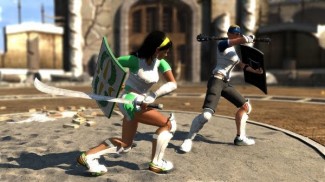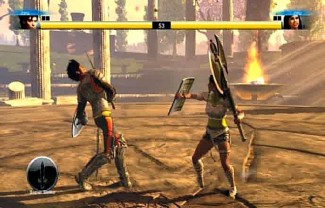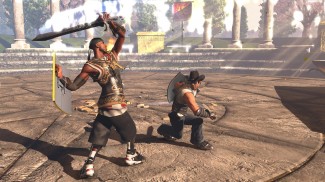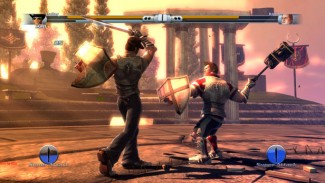Grapple Dog
LQ: 9.0
Recommended Age: 5+
Skills Used: Self-Awareness, Working Memory, Reading

In Sports Champions: Gladiator Duel, players use the PlayStation Move motion controller to duplicate the actions of both a sword and a shield. Players must defeat an opponent twice in a three game series in order to claim victory. Movements on screen are translated 1 to 1, so to swing the sword at an opponent, players simply swing their controller. Players must aim their attacks around an opponent’s block, and for every successful hit or parry, players build up combo points. If they build up enough points, players are allowed a special powerful attack that inflicts significant damage. The game features a moderate amount of violence, as players compete in a duel with swords and shields, but there is no blood, and players are not visibly injured by the fights. The game is relatively easy to learn and play, but since the gameplay revolves around fighting, Sports Champions: Gladiator Duel is only recommended to players ages 10 and up.
Managing our actions, feelings and behaviors.

During the heat of battle it can be very easy to get disoriented and begin swinging wildly. In order to land hits, players need to remain calm and aim around their foe’s shield. If players build up their combo meter and earn a special attack, they must follow specific on-screen prompts. These prompts consist of a series of slashes that a player must perform with the controller. It requires speed and precision to replicate them. Only by making careful movements will the player make a successful special attack.
Understanding our own actions, thoughts and feelings.
In order to become proficient in the game and develop a technique, players must understand their tendencies and identify strategies that work well. Players must constantly judge their own actions, making changes to improve their performance. For example, if players rely too heavily on striking the upper body, their opponent will easily block attacks. However, if they begin to mix up attacks, striking the lower body, legs and sides of their opponent, their attacks become more unpredictable and harder to block. But a battle cannot be won by focusing only on attack, as opponents will find openings in defense, and strike. Players must be wary when attacking, as their body will be exposed to an opponent's advance. Players must balance attacks with steady defense, while having the awareness to understand how their actions are perceived by their opponent.
Use this Play Together guide to learn how you can help your child turn Adventure Factory play time into a positive learning and relationship-building experience. To learn more about why playing games with your children is so important, check out our Science of Play page.
Take a minute to talk with your child about how the Self-Control and Self-Awareness thinking skills work, and why they are important for success in school and at home.
 Sports Champions: Gladiator Duel functions as a single player and multiplayer game. If you have two Move controllers, you can play against your child. Feel free to take turns with your child if you only have one controller. Coach your child through his or her match, offering strategic advice.
Sports Champions: Gladiator Duel functions as a single player and multiplayer game. If you have two Move controllers, you can play against your child. Feel free to take turns with your child if you only have one controller. Coach your child through his or her match, offering strategic advice.
Gameplay Goals:
Our Make it Work activities are designed to transform your child’s gameplay to real-world improvements in thinking and academic skills. If you’re just getting started with LearningWorks for Kids, we suggest you try them all to find which are the best for you and your child.
Read over the pages for Self-Control and Self-Awareness. Then take some time to introduce these thinking skills to your child.
Explain that:
Delay impulsive behaviors.
 You can provide some easily learned strategies that will train your child to practice self-restraint. Help your child to identify situations that require self-control and encourage him to think of actions that will make it easier to remember and practice. The following are some ideas for practicing response inhibition with your child:
You can provide some easily learned strategies that will train your child to practice self-restraint. Help your child to identify situations that require self-control and encourage him to think of actions that will make it easier to remember and practice. The following are some ideas for practicing response inhibition with your child:
 Talk out loud about your own problem solving and thinking strategies. Use statements such as, “This reminds me of the time when we tried to do this . . .” or “I need to think about what worked and didn’t work last time we did this” or “I want to learn from the mistakes I made last time, so let me think about a new way to try this.” Encourage your child to use similar self-instructional/metacognitive strategies for problem solving.
Talk out loud about your own problem solving and thinking strategies. Use statements such as, “This reminds me of the time when we tried to do this . . .” or “I need to think about what worked and didn’t work last time we did this” or “I want to learn from the mistakes I made last time, so let me think about a new way to try this.” Encourage your child to use similar self-instructional/metacognitive strategies for problem solving.
Sports Champions: Gladiator Duel is one of the more active games included in Sports Champions. Players must exert themselves to win, as the power of their attacks is determined by how forcefully they swing the PS Move controller. This makes it an excellent game to use for childrern with ADHD, as physical exercise as been shown to produce BDNF (brain-derived neurotrophic factors), proteins in the brain that can help enhance memory and focus. This makes the game a viable tool for improving learning and attention when following the recommendations below.
All membership plans come with full access to our entire suite of tools learning guides, and resources. Here are a few of the ones we think you’ll like the most: